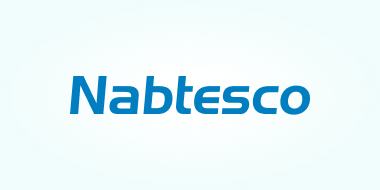
Build a Robust Supply Chain
Basic Approach
Basic Approach to Sustainability in Supply Chain
The Nabtesco Group does business with about 1,600 suppliers of various scales, centering around the purchase of metal parts, and electronic and electrical components, outsourced machining, assembly and processing. Our business with suppliers is an important factor that affects the Nabtesco Group’s cost structure and QCD performance. It is indispensable to secure the supply chain continuously in order to achieve medium- to long-term growth. Therefore, we develop collaboration systems through fair business transactions based on the proper cost structure, and close partnerships with suppliers.
Also, we are well aware of the importance of meeting the demands and expectations of society regarding social and environmental impacts of activities in our supply chain. By developing mutual trust relationships with suppliers through fair transactions, we are committed to meeting our social responsibilities not just through the efforts of the Nabtesco Group alone but with the cooperation of the entire supply chain.
Designation of Important Suppliers
Among the companies that make up our supply chain, we designate those that are particularly important for the Group’s business continuity as “major suppliers.” In FY2024, as in FY2023, the number of major suppliers among the Group’s primary suppliers came to 100, and these major suppliers accounted for around 70% of the Group’s total procurement amount. The Group updates the selection of major suppliers every year and in FY2024 we included ESG performance, country risks, risks specific to companies in the machinery sector, and risks of critical components in the criteria for selecting major suppliers, in addition to transaction volume and QCD performance.
| FY2021 | FY2022 | FY2023 | FY2024 | |
|---|---|---|---|---|
| Number of major suppliers (companies) | 100 | 100 | 100 | 100 |
| Share of total procurement amount (approximate value) |
70% | 70% | 70% | 70% |
Criteria for selecting major suppliers
- Transaction volume
- Quality, cost and delivery (QCD) performance
- Ability to develop technologies
- Financial health
- ESG performance*1 (added in FY2023)
- Country risks*2 (added in FY2023)
- Risks specific to the machinery sector*3 (added in FY2023)
- Risks of critical components*4 (added in FY2024)
- *1 With regard to ESG performance, we give preference to the following companies when designating major suppliers: companies that have set their own GHG (Greenhouse gas) emissions reduction targets and gained high scores for human rights and environmental due diligence in the SAQ (Self Assessment Questionnaire) and other assessments and audits.
- *2 “Country risks” refers to the political, economic and social risks specific to a certain country/region.
- *3 Nabtesco belongs to the machinery sector. We specify the risks peculiar to the sector in consideration of the procurement items, the procurement amount per procurement item, and related country risks.
- *4 NCritical components refers to products produced by suppliers with specificunique technologies that are essential to our products
Percentage of Procurement Items of the Nabtesco Group in Japan (Unit: %)
| 2020 (actual) | 2021 (actual) | 2022 (actual) | 2023 (actual) | |
|---|---|---|---|---|
| Metal parts (materials, machining) | 48 | 54 | 51 | 53 |
| Outsourced assembly parts and products | 18 | 18 | 19 | 19 |
| Standard parts (bearings, oil seals, etc.) | 12 | 14 | 16 | 13 |
| Electronic and electorical components | 9 | 8 | 7 | 8 |
| Other parts | 13 | 6 | 7 | 7 |
| Total | 100 | 100 | 100 | 100 |
Percentage of Procurement Cost of the Nabtesco Group (FY2023)
- *After secondary suppliers, there are no suppliers that have an economic impact on Nabtesco.
Areas in the Nabtesco Group's supply chain where human rights and environmental risks are expected
The Nabtesco Group has clarified areas with potential human rights and environmental risks in its supply chain. The distribution of these risks is identified as follows:
Areas in the Nabtesco Group's supply chain where human rights and environmental risks are expected
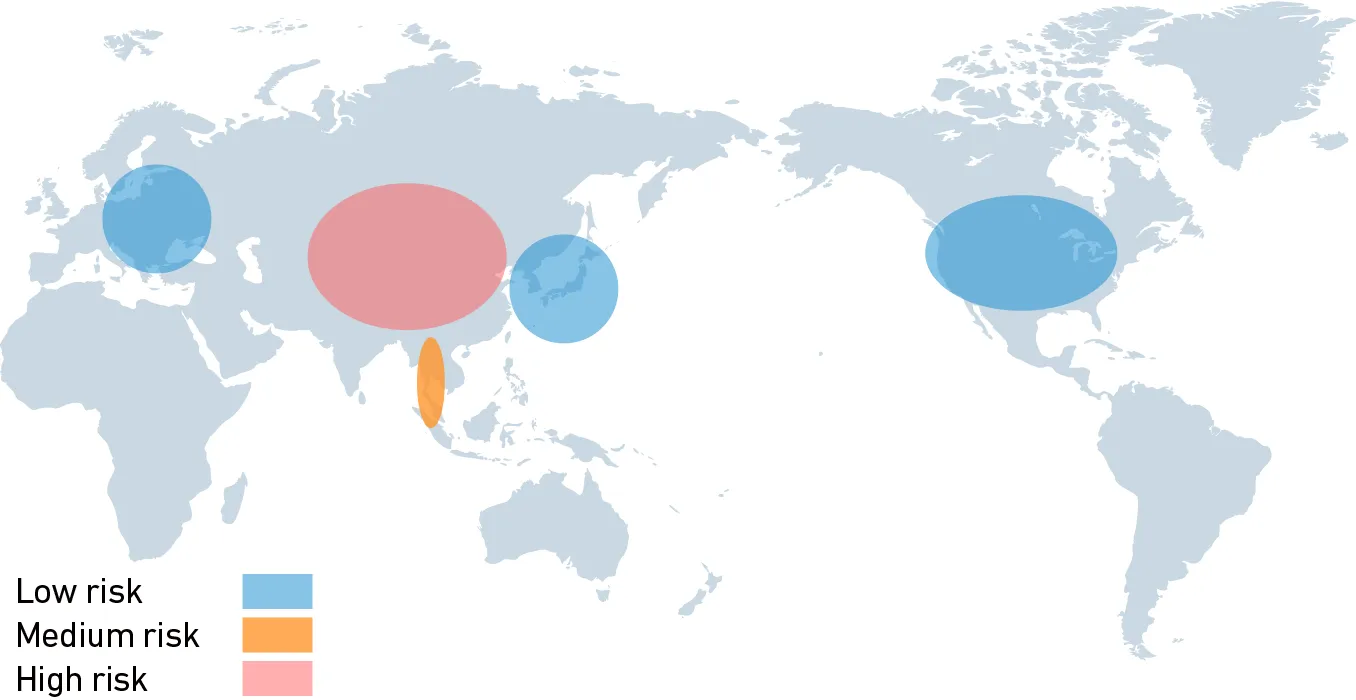
Policy
Nabtesco Group CSR-Oriented Procurement Policy
The Nabtesco Group is promoting CSR procurement to address ESG issues in the supply chain. In view of the need to prevent the emergence of increasingly complex and diverse supply chain risks in recent years, we revised the Nabtesco Group CSR-Oriented Procurement Policy in December 2020 with the approval of the Executive Management Committee and announced that we would further strengthen supply chain management.
- *In formulating this policy, we referred to RBA (Responsible Business Alliance), ISO20400, ISO26000, the United Nations Global Compact, and other international guidelines, and also incorporated the ideas expressed in the Nabtesco Group Code of Ethics.
To Our Suppliers
The Nabtesco Group is committed to ensuring management transparency and providing safety, security, and comfort. By fulfilling its social responsibilities as a company, the Nabtesco Group aims to contribute to the resolution of environmental and social issues as well as to pursue sustainable enhancement of corporate value, as set forth in the Nabtesco Group CSR-Oriented Procurement Policy, and has endeavored to put it into practice.
In recent years, there has been an increasing demand for CSR-oriented procurement, in which a company is responsible for the impact of its business activities on the environment and society as a whole, while at the same time fulfilling its social responsibilities through the entire supply chain together with suppliers that consider these issues.
Under these circumstances, we have revised the Nabtesco Group CSR-Oriented Procurement Policy to respond to changes and heightened social demands in the supply chain. In this revision, "ethics," "human rights and labor practices," "occupational safety," "quality," "environment," "harmony with society," and "management" are defined with reference to international guidelines.
We ask our suppliers, who are important business partners of the Nabtesco Group, to understand the purpose of this policy and put it into practice internally and also request their business partners to understand and implement this policy accordingly.
We believe that developing CSR-oriented supply chain management will lead to the coexistence and co-prosperity of our suppliers and the Nabtesco Group. I would like to ask for your cooperation in promoting CSR-oriented procurement by closely working with the Nabtesco Group.
April 2024
General Manager, Production Innovation Division
Nabtesco Corporation
Tomoaki Shiramizu
The Nabtesco Group’s CSR-Oriented Procurement Policy
1.Ethics
- (1)Corporate ethics and compliance with laws and regulations
Observe the laws and regulations enforced in each country and region and also comply with your company’s in-house rules. Take actions with integrity in line with accepted ethical standards and social norms. Do not engage in misconduct, including fraud, extortion and money laundering.
In addition, set your own in-house rules and guidelines on misconduct to prevent such acts and ensure the appropriateness of your business operations. - (2)Illegal payments
Never give bribes or other similar illegal payments to, or accept them from, government officials, customers, suppliers and other business partners, either directly or indirectly and regardless of method of transfer. - (3)Information disclosure
Fulfill your accountability duties by disclosing important information about your company’s finances, management and business activities in a timely, appropriate and impartial manner to your stakeholders including shareholders and investors. - (4)Intellectual property rights
Respect the intellectual property rights of third parties including patent rights, utility model rights, design rights, trademark rights, copyrights and trade secrets, and never infringe upon any of these rights.
Also, based on the recognition that they are important assets of your company, manage your own intellectual property rights appropriately and in line with your in-house rules, work to protect them, and make effective use of them. - (5)Fair and free competition
Comply with the competition laws and antimonopoly laws enforced in each country and region and with the related in-house rules of your company to conduct transactions based on free and fair competition. - (6)Internal reporting system
Have an internal reporting system in place so that workers can make reports and request advice about acts that may constitute violations of the law, regulations or your in-house rules in relation to corporate ethics, occupational safety, the environment, human rights and other issues.
Do not treat directors, officers or employees who have made reports and requested advice through the internal reporting system in a disadvantageous manner for the reason that they have made such reports and requests. - (7)Responsible procurement of minerals
Do not purchase or use conflict minerals produced in conflict areas and high-risk areas.
Also, cooperate with the Nabtesco Group when the Group conducts a survey on conflict minerals.- *High-risk areas: Countries and regions where armed groups and organizations involved in corruption and other misconduct, human rights infringements and environmental destruction are active
- (8)Information security
Recognize the importance of personal information pertaining or belonging to suppliers, customers, consumers and employees and treat such information appropriately and in line with the related laws and regulations and with your in-house rules.
Manage confidential information belonging to your company and third parties in a strict manner and in line with your in-house rules, and never allow access to such information by outsiders. Do not use the information for anything but legitimate operational purposes. - (9)Appropriate export and import
Conduct export and import transactions in compliance with the related laws and regulations enforced in each country and region and with your in-house rules. Also, when conducting export and import transactions, follow the necessary procedures, including filing applications for permission with the authorities and submitting notifications and reports to the authorities as required, pursuant to the related laws and regulations.
2.Human Rights and Labor Practices
- (1)Prohibition of forced labor
Prohibit forced labor, compulsory labor, prison labor, labor by slavery and human trafficking and bonded labor, and never use any of these forms of labor. Based on the recognition that all labor should be voluntary, guarantee the freedom of workers to quit working for your company or terminate employment agreements with the company.
Also, unless legally mandated, do not retain, destroy, hide or confiscate workers’ identity documents, passports, work permits, immigration applications and others, and do not reject the use of these documents by the workers themselves. -
(2)Prohibition of child labor
Prohibit the labor and employment of workers aged younger than the legal working age set in each country and region where your company is conducting business and do not use such workers.
Never make young workers who have not reached the age of 18 work at night or overtime or engage in jobs that pose a threat to their health and safety.- *Children: Those younger than the legal working age
- *Young workers: Those who have reached the legal working age and are younger than 24 years old
- (3)Working hours and holidays
Strive to reduce overtime work and do not make workers work longer than the legal working hours set by the laws and regulations of each country and region where your company is conducting business.
Also, give workers holidays and annual paid leave as provided for by the laws and regulations of each country and region where your company is conducting business. - (4)Wages and welfare
Comply with the laws and regulations on wages and others set in each country and region where your company is conducting business, including those on minimum wages and overtime wages. Strive to pay living wages to workers and provide them with welfare benefits as mandated by laws and regulations. - (5)Prohibition of inhumane treatment
Prohibit the inhumane treatment of workers, including mental, physical and sexual abuse, corporal punishment and harassment. - (6)Prohibition of discrimination
Provide all workers with fair and equal opportunities with regard to employment, training and promotion. Prohibit discrimination on the basis of race, belief, gender, age, social status, nationality, ethnicity, religion, disability, sexual orientation and others. - (7)Freedom of association and collective bargaining
Respect workers’ rights to form and participate in a labor union and to participate in collective bargaining and peaceful meetings.
Also, provide workers with opportunities and environments to enable them to engage in dialogue with the management team about working conditions and business practices without fear of becoming subject to discrimination, revenge, threats, harassment and others.
3.Occupational Safety
- (1)Occupational health and safety
Manage workers’ risk factors (related to chemical substances, electricity and other energy sources, fire, vehicles, falls and others) by implementing appropriate design, engineering and administrative controls as well as preventive maintenance, while providing workers engaged in high-risk operations with personal protective equipment and educational materials. - (2)Occupational accidents
In order to prevent workers from being injured or becoming ill due to occupational accidents and to manage, record, monitor and report the relevant issues, establish procedures and systems for the following:- ・Reporting by workers
- ・Classification and recording of injuries and illnesses
- ・Provision of medical care
- ・Investigation into injuries/illnesses
- ・Implementation of corrective measures
- ・Return of workers to the workplaces
- (3)Jobs with heavy physical load
In order to prevent employees from getting injured or becoming ill due to jobs involving heavy physical loads, specify the manual labor required for the treatment of materials and the lifting of heavy items, extremely repetitive physical work, jobs that require standing for long hours and the like. Then provide employees engaged in such jobs with regular break times, require that they use work assistance equipment and foster the sharing of heavy duties. - (4)Safety measures for machines
In order to prevent workers from getting injured, assess machine-related risks and implement measures against the risks, including carrying out legally mandated inspections and implementing protective measures, such as danger marking, provision of protective equipment and the installation of safety interlock equipment and partitions that serve as barriers. - (5)Hygienic equipment, meals and residences
Provide workers with access to clean restrooms, safe drinking water, hygienic canteens, safe and clean dormitories and medical services. - (6)Safety and health-related communication with workers
Provide workers with workplace health- and safety-related training in their mother tongue or in a language that they can understand, and also post relevant information within the facilities.
4.Quality
- (1)Ensuring safety, comfort and a sense of security for products
In order to provide customers with high value-added products and services that meet their needs, give first priority to safety and establish business processes that also give consideration to comfort and a sense of security.
In addition, meet the safety criteria and requirements as provided for by the related laws, regulations and standards of each country and region, and provide accurate information about your products and services, including specifications, quality details, handling methods and substances contained in them. - (2)Ensuring market competitiveness in terms of quality
Build a system to supply your products and services in a stable manner, while ensuring their market competitiveness in terms of quality, pricing and delivery deadlines. At the same time, cooperate with your suppliers and help them ensure their market competitiveness in terms of quality, pricing and delivery deadlines.
Also, endeavor to continually improve your ability to develop technologies in order to provide products and services that meet the needs of customers and are competitive in the market.
5.Environment
- (1)Prevention of pollution
In order to prevent air, water, soil and other types of pollution, identify pollutants and pollution sources and appropriately manage them by implementing measures, such as additionally introducing pollution prevention equipment and reviewing production processes. - (2)Reduction in the use of resources
Make effective use of minerals, materials, fossil fuels and others, thereby reducing the use of these resources. - (3)Management of hazardous substances
Identify chemical and other substances that have hazardous impacts on human health and the environment, and appropriately manage the transfer, storage, use, recycling, reuse and disposal of such hazardous substances. - (4)Waste
Treat and manage waste in an appropriate manner and foster waste reduction and recycling. - (5)Atmospheric emissions
Regarding emissions of volatile organic compounds, aerosols, corrosive substances, fine particles, ozone depleting substances and by-products from incineration processes implemented as part of your business operations, comply with the laws and regulations of each country and region where your company is conducting business. - (6)Restrictions on the use of materials
Comply with laws and regulations that prohibit or restrict the use of specific substances in products and manufacturing processes and that provide for labeing related to recycling and waste disposal. - (7)Water
Appropriately control the amount and quality of water resources consumed as well as of the water used and discharged by your company, and work to make efficient use of water to reduce its use (for water saving). - (8)Energy and greenhouse gases
Record the amounts of energy consumption and greenhouse gas emissions for reducing the use of energy and emissions of greenhouse gases. - (9)Biodiversity
Conduct business activities in consideration of biodiversity and ecosystems and work for the conservation of biodiversity. - (10)Environmental management system
Build an environmental management system and continue to improve it. - (11)Environment-friendly products
When planning, developing and designing a product, identify its life cycle environmental impact and strive to increase its energy and resource efficiency as well as its recyclability.
6.Harmony with Society
- (1)Respect for local culture and customs
Respect the culture and customs of each region and community in which you are conducting business activities. - (2)Social contribution
Engage in dialogue with local communities and society at large and conduct social contribution activities, volunteer activities, educational activities and local employment activities.
7.Management
- (1)Handling of complaints
Build a system to accept requests and complaints from your business partners and make responses to and reports about the complaints in a prompt and appropriate manner. - (2)Evaluation and management of risks
Evaluate risks related to the environment, occupational health and safety, legal compliance and others, and implement measures against the risks. - (3)BCP (Enhancement of ability to continue business)
Implement a highly effective BCP to resume business operations promptly even in the face of a crisis, such as a large-scale disaster or pandemic, thereby continuing to fulfill your supplier responsibility for customers.
In preparation against an imminent crisis, conduct educational training and enhance the organizational risk management ability. (Also work to acquire certification for the effectiveness of your BCP from an external organization and keep the certification up to date.)- *The Nabtesco Group is supporting suppliers in formulating BCPs, in addition to creating the Group’s own BCPs, toward increasing the resilience of its supply chain.
- (4)Awareness-raising across the supply chain
Communicate the details of this CSR-oriented policy to your suppliers and urge them to implement measures in line with the policy.
System
Promotion Framework for CSR-Oriented Procurement
We at the Nabtesco Group have been working on manufacturing innovation and promoting collaboration with suppliers with the aim of strengthening our comprehensive procurement capabilities from the perspectives of sustainability, including quality, cost and delivery (QCD), and technological development. In order to achieve medium- to long-term growth for the Group, it is essential to secure a sustainable supply chain, for which we need to promote fair procurement and collaboration with our suppliers.
Also, in order to promote CSR-oriented procurement, we need to have expertise and know-how on environment- and human rights-related issues, which are not conventionally handled by procurement departments. Therefore, the Procurement Planning Department of the Production Innovation Division, in collaboration with the head office departments, plays a central role in promoting CSR-oriented procurement, including supporting the activities conducted to this end by the in-house companies and Group companies. The Nabtesco CSR Procurement Policy is discussed and decided by the Management Committee (MGC). For measures related to CSR-oriented procurement, representatives of the procurement departments of each in-house and Group company discuss and decide on the policies and measures at the Group Procurement Meeting and then obtain approval for the decisions from the Management Materiality Committee, which reports directly to the CEO.
Through these Group-wide efforts, we endeavor to fulfill our social responsibility throughout the supply chain in cooperation with our suppliers.
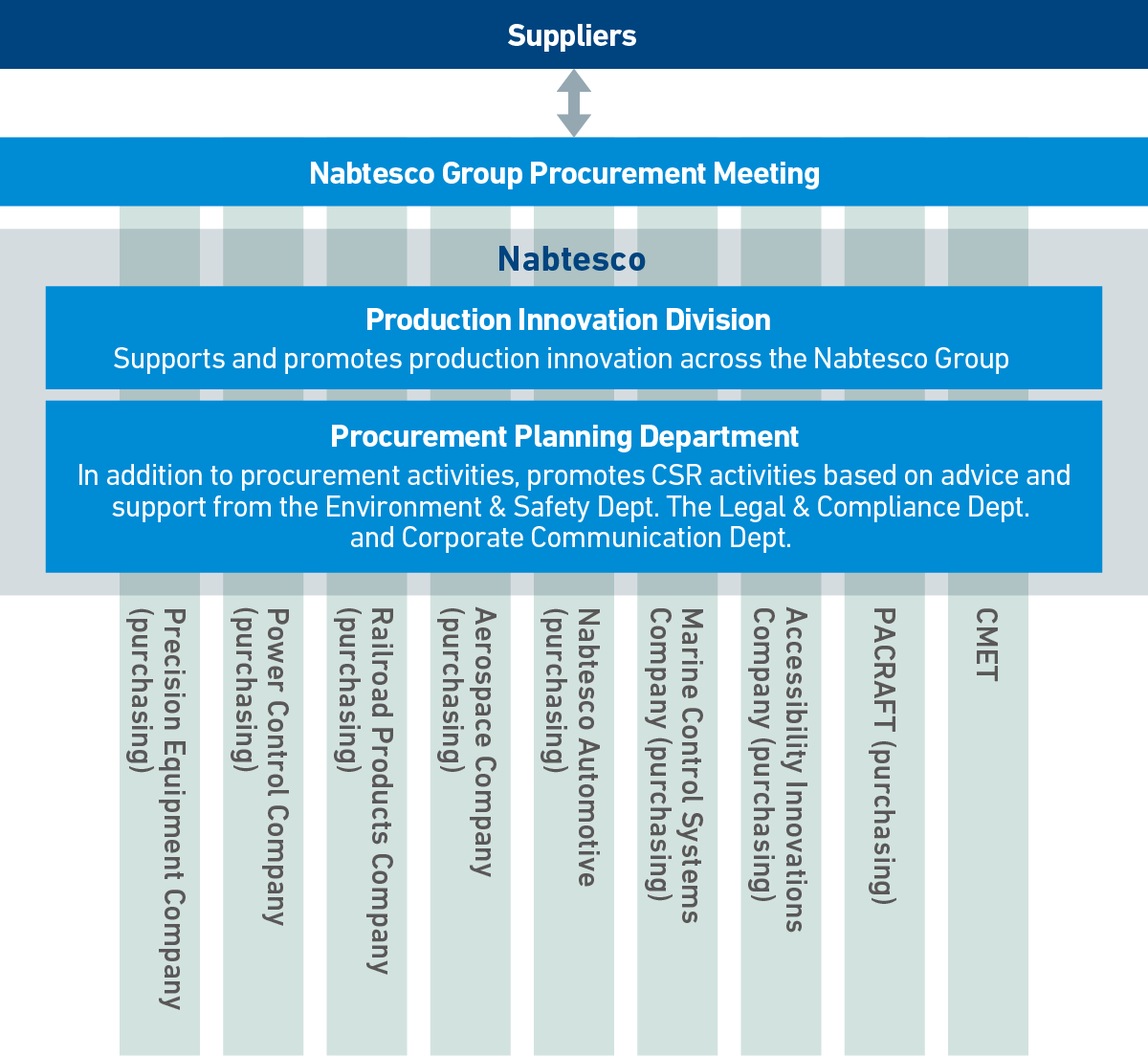
Measures
Basic Purchase Agreement
We have revised the Basic Purchase Agreement that we conclude with new suppliers, in line with the Civil Code Amendments effective April 1, 2020. In the Agreement, we list not only compliance with the CSR-oriented Procurement Policy, thorough compliance including the prevention of any form of corruption such as bid rigging or bribery, but also consideration to the environment and occupational health and safety and the elimination of anti-social forces as the most important items to be observed by our suppliers.
Basic Purchase Agreement (Excerpt)
- (Examples)
- Article 9: Ensuring occupational health and safety and appropriate working conditions (including prohibiting forced labor and child labor, illegal work of foreign workers)
- Article 30: Obligation to prevent pollution, manage the environment, and manage the use of specified hazardous substances
- Article 31: Obligation to prevent workplace disasters
- Article 33: Formulation of business continuity plans
- Article 34: Prohibition of bid rigging and bribery
- Article 49: Elimination of anti-social forces
We have requested that even existing suppliers comply with our Basic Purchase Agreement, as well as consideration of the environment, safety, and health through the SAQ. Through the penetration of a CSR-Oriented Procurement Policy within our supply chain, on-site briefings, and the SAQ, we have taken proper actions to encourage new and existing suppliers to conduct themselves in accordance with social norms.
Activity to Make Suppliers Aware of the Nabtesco Group’s CSR-Oriented Procurement Policy
Making Sure That Suppliers Understand the Policy
As part of our efforts to facilitate understanding of the Policy among all suppliers, we made sure that all of them understood the details of the revision and asked each to submit a letter of consent to the Policy in June 2021. Based on the Policy, which has been translated into multiple languages (Japanese, English, Chinese and Thai), we will continue to execute a PDCA cycle and promote CSR-oriented procurement by proactively engaging in communication with suppliers. Moreover, by continuously reviewing our procurement to ensure adherence to the Policy, we will respond promptly to ever changing community expectations and ESG issues.
If any of our existing or new suppliers is found to have seriously violated the “Policy” or “Basic Transaction Agreement,” we will ask the supplier to correct the situation and implement improvements. If improvement cannot be confirmed, we will nevertheless review our business relationships with that supplier. To date, we have not terminated business with any supplier due to such a violation.
Briefing Session for Suppliers
Regarding the Nabtesco Group’s CSR-Oriented Procurement Policy, we have been holding, since the latter half of FY2014, briefings on the Policy for our suppliers as one of our activities to raise their awareness of the details. At the briefings, we explain to participating suppliers why it is important for us to fulfill our corporate social responsibility and ask them to support us in the CSR activities that are deemed particularly important for that fiscal year. In FY2023, we briefed about 430 suppliers on the policy at eight of our sites through face-to-face and online format.
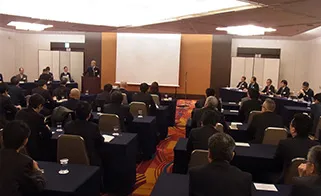
Briefing Session for Suppliers
Number of suppliers participating in the briefing sessions (Results)
| 2020 | 2021 | 2022 | 2023 |
|---|---|---|---|
| Approx. 180 (Offline session) | Approx. 350 (Mainly online) | Approx. 360 (Mainly online) | Approx. 430 (Offline and online session) |
Educational Program
Training for Suppliers
We are implementing a mainly online educational program on CSR- and ESG-related themes for suppliers. In FY2023, around 760 of our primary suppliers received training on general CSR, conflict minerals, and cybersecurity under the program. We are working to help our suppliers deepen their understanding of the need to foster CSR-oriented procurement across the supply chain through the program. We also introduce cases in which supply chain risks were materialized and badly affected our business continuity as well as examples of good outcomes in the program.
We will continue to hold briefings and implement the educational program to help existing and new suppliers to fully understand and implement the Nabtesco Group’s CSR-Oriented Procurement Policy.
Training for Nabtesco Group Employees in Charge of Procurement
We also provide employees in charge of procurement, who are often in direct contact with suppliers, with education and training for CSR-oriented procurement, with the goal of further familiarizing both members of our group and suppliers with the CSR-Oriented Procurement Policy.
In addition to the basics related to CSR procurement in general, including labor (human rights), ethics, environment, and health and safety, we distributed e-learning content on biodiversity, reducing global resource use, conflict minerals, cybersecurity, and other topics in particular to employees and managers belonging to Nabtesco’s procurement departments in Japan. Everyone provided with the content completed the course.
Checking the Degree of Awareness and Implementation of the CSR-Oriented Procurement Policy by Suppliers
Implementation of SAQ (CSR Questionnaire)
To check the effectiveness of the Nabtesco Group’s CSR-oriented procurement, we have implemented an SAQ for our primary suppliers, including our major suppliers, in and outside of Japan every year. Following the revision of the CSR-Oriented Procurement Policy in December 2020, we also renewed our SAQ form by using the standard questionnaire form created by the Global Compact Network Japan (GCNJ) as an SAQ template to be shared by its members, including Nabtesco. By using this template, we reduced the burden imposed on suppliers requested to answer the SAQ, while also updating the questions by adopting the standard questions prepared by the Global Compact Network Japan (GCNJ) and adding items from the Nabtesco Group’s CSR-Oriented Policy.
In FY2023, we set the target of conducting the SAQ survey on 1,600 of our primary suppliers, including the 100 major suppliers. We subsequently conducted the survey on 1,182 suppliers (1,137 in FY2022), including the 100 major suppliers (also 100 in FY2022), and thus achieved the survey target. As for the response rate, we received replies from 83% of the targeted primary suppliers (77% in FY2022). The response rate for our 100 major suppliers was 100% (95% previously).
According to the results of the SAQ conducted in FY2023, eight suppliers were assessed to have high ESG risks*. In FY2023, we received no reports of serious noncompliance regarding labor and environmental issues for our supply chain.
After conducting the SAQ, we informed each supplier of the results, including their own score and the average score of all respondents for each of the questions, so that they can understand where their own CSR activities rank and points to be improved.
* We define suppliers whose total score for the nine questions in the SAQ is 50% or below and who account for a large share of our procurement amount as “suppliers with high ESG risks.”
ESG risk reduction flow in collaboration with suppliers
| Step 1 | Conduct an annual SAQ to examine nine risks in the supply chain, including human rights, the environment, and labor. |
|---|---|
| Step 2 | Extract suppliers with low scores based on the survey results (Since the supplier with the highest procurement amount has a great influence on the supply chain, we focus on the suppliers with the highest procurement amount.) |
| Step 3 | Conduct second-party assessment with a focus on items related to human rights and the environment (Response to human rights due diligence and environmental due diligence) |
| Step 4 | After second-party assessment is completed, plan corrective actions with the supplier for points that need to be corrected, and continuously follow up until improvements are made. |
| Step 5 | On-site assessment of suppliers by independent auditors (third-party assessment) |
| Step 6 | Based on the results of the third-party assessment, plan corrective actions with the supplier for points that need to be corrected, and continuously follow up until improvements are made. |
FY2023 SAQ Response Results (Suppliers average shown in blue)
Primary suppliers
Major suppliers
Supporting Suppliers in Conducting CSR Activities Based on the SAQ Results
Assessment and Development of Suppliers' CSR Activities (Second Party Assessment)
Nabtesco evaluates suppliers' CSR activities (second-party assessment) through interviews by the Procurement Planning Department to ascertain the suppliers' level of understanding of the CSR procurement policy and the state of implementation. The priority target of these interviews and audits are major suppliers whose SAQ scores are low for human rights and the environment and who have not yet set their own GHG emissions reduction targets. We update the details of the interviews and assessments from time to time. When revising the CSR-Oriented Procurement Policy, we added items related to due diligence for human rights and the environment to the SAQ. Furthermore, since FY2022, we have been using our own in-house check sheet for the assessments, to which items on labor and occupational health and safety have also been added.
For FY2023, we set the target of conducting CSR-related interviews and audits for 25 of our major suppliers and subsequently interviewed and assessed 27 major suppliers, thus achieving the target. Of the eight suppliers that had been deemed to have high ESG risks according to the FY2023 SAQ results, we supported seven companies to make and implement plans to take corrective actions.
Moreover, in FY2022, we started to set the number of CSR interviews with suppliers as a medium-term target KPI, while promoting third-party audits by an independent auditing organization from 2024. (Please refer to “On-site Supplier Assessments by Independent Auditors”)
Going forward, we will continue to identify the ESG risks posed to our suppliers, assess corrective action plans and activities to implement them, and foster support through individual interviews with suppliers.
Number of Companies Interviewed
| 2020 | 2021 | 2022 | 2023 | 2024 | |
|---|---|---|---|---|---|
| Number of companies (plan) | - | - | 25 | 25 | 35 |
| Of the above, number of companies on Tier 2 or below (plan) | - | - | 5 | 5 | 5 |
| Number of companies (actual) | 10 | 22 | 25 | 27 | - |
| Of the above, number of companies on Tier 2 or below (actual) | 0 | 2 | 0 | 11 | - |
Initiatives to Reduce Greenhouse Gas Emissions in Collaboration with Suppliers
The Procurement Planning Department and the Environment & Safety Department are jointly supporting suppliers in monitoring greenhouse gas (GHG) emissions and setting their own GHG emissions reduction targets. These activities fall under SBT Scope 3, which contributes to the reduction of greenhouse gas emissions not only within the company but also for the entire supply chain. We have been pushing forward with the activities so that the initiatives will be implemented by approximately 100 suppliers, which account for the top 70% of our total procurement amount, by 2050.
Percentage of Suppliers in the Top 100 Suppliers in Terms of Procurement Amount that Have Already Been Monitoring Greenhouse Gas (GHG) Emissions and Set Emissions Targets
| 2020 (actual) | 2021 (actual) | 2022 (actual) | 2023 (actual) | 2024 (plan) |
|---|---|---|---|---|
| 66.3% | 70% | 72% | 82% | 100% |
*We aim to complete the plan by FY2024, a year ahead of the schedule (FY2025).
On-site Supplier Assessments by Independent Auditors (third-party assessments)
We have also started third-party assessments, in which independent auditors visit suppliers on site. We are also working to correct and improve supplier ESG risks based on objective CSR audit reports.
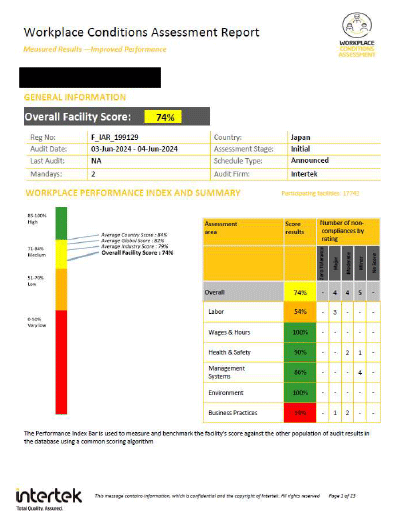
- *Workplace Condition Assessment Report (Example of third-party assessment)
Nabtesco Group Statement on Responsible Sourcing of Minerals
For the responsible sourcing of minerals, the Nabtesco Group will cooperate with its suppliers to prevent the use of conflict minerals*1 such as tin, tantalum, tungsten, gold, cobalt, mica and others. Conflict minerals are those which are supplied via parties in supply chains that are complicit in the abuse of human rights in conflict-affected and high-risk areas in the Democratic Republic of the Congo (DRC) and surrounding countries.
In 2020, we added a paragraph entitled “Responsible procurement of minerals” to the Nabtesco Group’s CSR-Oriented Procurement Policy to contribute toward maintaining international peace and safety through responsible sourcing of minerals and also to enhance our risk management to ensure the sustainability of our supply chain. We ask suppliers to submit a letter of consent to the Policy. In 2022, we conducted a survey of our 100 major suppliers, which together account for around 70% of our total procurement, and in 2023, we added another 100 suppliers, expanding the scope to 200 suppliers, which together account for around 80% of our total procurement, to ensure safety in regard to the procurement of minerals to be delivered to us. For the survey, we used the CMRT*2 and EMRT*3 provided by the Responsible Minerals Initiative (RMI) as standardized formats. In addition, to enhance the effectiveness of the survey, we also check the status of procurement from smelters that have passed RMI's Responsible Minerals Assurance Process (RMAP) audits. According to the conflict minerals survey results for FY2022, 28 of our major suppliers procured the relevant minerals from smelters that had passed the RMI's RMAP audits. However, for 14 suppliers, we were unable to identify the smelters from which they had procured the minerals.
For the additional 100 suppliers from 2023 to the present, 9 were sourcing from smelters that had passed RMI's RMAP audits. In addition, for 16 suppliers, we were unable to identify the smelters from which they had procured the minerals.
In response to our customers’ requests, we have been conducting surveys on the countries of origin of minerals in cooperation with our suppliers.
From the results of the conflict minerals survey, we will identify suppliers sourcing from smelters that have passed RMI's RMAP audits and suppliers that have not yet identified their smelters. In the event that the use of any potentially unethically sourced minerals is detected through such surveys, we will bring up the issue with the related suppliers and promptly take actions to discontinue their use and find an alternative supplier.- *1 The term “conflict minerals” refers to minerals (namely, gold, tantalum, tin, tungsten, cobalt, mica and others) whose proceeds of sale may be partially used to fund armed groups and which thus pose risks regarding human rights violations, environmental destruction and corruption. In the United States, pursuant to the Dodd-Frank Wall Street Reform and Consumer Protection Act established in 2010, companies using gold, tantalum, tin and tungsten, which are designated as conflict minerals under the Act, are required to report such use to the Securities and Exchange Commission (SEC).
- *2 CMRT: Conflict Minerals Reporting Template
- *3 EMRT: Extended Minerals Reporting Template
Hotline for business partners (including suppliers, etc.)
The Nabtesco Group has a hotline for suppliers with a view to ensuring transparency and fairness in its transactions with business partners for the sustainable development of mutual relationships.
We will prevent the occurrence of problems or take corrective actions in response to the information given to us via the hotline about the Nabtesco Group’s or its individual member’s unfair acts or acts that might constitute misconduct.
Partnership with Suppliers
The Nabtesco Group is actively working to improve the productivity and ESG performance of its suppliers. In manufacturing products for our company, we provide guidance on improvements in quality control, such as compliance with work standards, eradication of human factors, and elimination of defective products. We also help suppliers to conduct 5S activities on a regular basis at their plants. Furthermore, we provide suppliers with training to improve productivity through functional analyses of products and daily operations using the Value Engineering (VE) method.
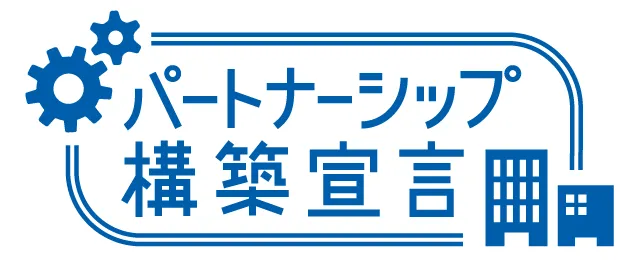
For the reduction of GHG emissions by suppliers, the Procurement Planning Department of the Production Innovation Division is leading efforts to provide support. The Department cooperates with the Environment & Safety Department and the Manufacturing Engineering Department to make use of the SAQ and CSR audit results to help suppliers set their own GHG emissions reduction targets and implement measures to achieve them.
In June 2020, Nabtesco Corporation made a “Declaration on Partnership Building.” The “Declaration on Partnership Building” was introduced by the Council for the Promotion of Partnership Building for the Future, which consists of representatives from the business and labor sectors and related ministers. It is a framework and mechanism promoted by the Cabinet Office and the Small and Medium Enterprise Agency. By presenting a policy of coexistence and co-prosperity to the Nabtesco Group’s suppliers, we aim to achieve sustainable growth with our suppliers.
Participation in United Nations Global Compact
The Nabtesco Group signed the United Nations Global Compact in April 2014 to show that it supports this international initiative, and has since been proactively participating in the activities conducted by the Global Compact Network Japan. We have worked to set norms and criteria and to solve problems for global CSR-oriented procurement (including themes on the environment, labor, and human rights) in cooperation with peers and companies in other industries in the study group on supply chains. In FY2017, Nabtesco was appointed a corporate leader for the supply chain study group again and contributed to the completion of an SAQ (self-assessment tool for CSR-oriented procurement) that can be used across the industry. In FY2020, we conducted a survey targeting the Nabtesco Group’s suppliers based on the standard questionnaire tool (common SAQ) formulated by GCNJ. We will continue to work on the enhancement of the SAQ while promoting its use in collaboration with external initiatives in the future.

